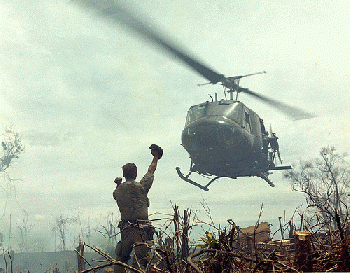We left on a wet, windswept September morning. A Military Police Company, the first to be sent to Vietnam, scattered to postings throughout the country and with our South Vietnamese Quan Cahn opposites.
At Fort Hood, rumors buzzed non-stop. At the pre-departure briefing our officers self-consciously hemmed and hawed about what to expect at destination. At last, one of them took stage center and said we were going to war. Not everyone in the room would come back. His colleagues looked at him askance.
Twenty-two years old, of trifling rank and corresponding responsibilities, a trained doorstop like privates in any army anywhere in every age. Our purpose for going? To bolster a struggling democracy by inserting American military organization, equipment and assistance into a bitter civil war. In my time, helping South Vietnam meant ferrying their combat troops by helicopter directly into battle, evacuating the wounded, and serving alongside ARVN (Army of the Republic of Vietnam) soldiery.
It never occurred to me to do anything else but go when told. We have a duty to obey our country's lawful commands. There was an oath to live up to. Loathing Communism was incidental. But I never went anyplace more reluctantly. My marriage was scarcely two months old, thus orders for an involuntary and totally unanticipated departure provoked something close to disintegration of the spirit as our time together vanished by degrees under the pressure of a force that could not be slowed, never mind stopped. Feelings about what was happening to my life were in a turmoil for which there are no words, even after fifty-six years.
A dense group of people pressed tightly together when Sergeant Cau drove us into Saigon city center. We came from Tan Sahn Nhut to shop for cigarettes (Vietnamese liked them mentholated) and perfume for Cau's wife at the U.S. military PX, downtown. The crowd's back was against us. They made no noise. None.
We blended in somewhat because we wore the same ARVN paratrooper camouflage uniform topped with a spiffy red beret, and our jeep was not American. Most likely none of that would have made any difference because the moment was not about the war. This was about anti-Buddhist prejudice by the Catholic majority government. "Let's have a look," I said to a reluctant Cau.
We got to the outer edge of the crowd just when the Buddhist monk, Thà ch Qua' � �ng Ä �a' � �c, sitting cross-legged at an Esso station lit a match. Instantly, his body was enveloped in a burst of dense smoke and flames. With one voice the crowd let out a deep, prolonged moan. We turned away and moved back through the thicket of people all now staring at the blackened, shapeless form of what moments ago had been a man.
In a remote Mekong Delta airstrip built by Japanese occupiers in World War II, I became a helicopter door gunner with weapons of World War II vintage. We dropped Vietnamese troops in the thick of battle. A line of H-21 Shawnee "flying banana" helicopters just a few feet above the ground, jumping huts and hedgerows, panicking animals, careening over astonished, gawping people. Sending epileptics into seizure. Viet Cong firing back from concealed holes in the ground. My place was at the front, just behind the pilots. A .30-caliber, belt-fed, air-cooled Browning spat tracers at targets a few feet below. We hovered inches above the ground long enough to debark our infantry quickly, peppering their exit with bursts of covering fire. Hot, spent brass casings hit our departing soldiers, their cue that we were now in the Drop Zone. That things had turned serious.
Extreme roller-coaster rides in rickety airframes with mostly hope and the optimism of youth for a shield. Actual physical protection was medieval. The motor pool cut half-inch steel plates that the pilots balanced on their laps to cover the chest area, groin to neck. I wore a flak jacket; I declined a set of armored diapers. "Apocalypse Now" uses Huey helicopters that were faster and more maneuverable than our clumsy giants, but the sights and sounds are spot-on. Our CO was no Robert Duvall with a love of "napalm in the morning," but the scene captures every bit of the energy, the noise, Mr. Toad's Wild Ride, and the blood-lust that came over us sitting in an open door behind a machine gun.
ARVN did not grouse. There were times (med-evacs) when men died in my arms. Quietly, acutely conscious of what was happening, our eyes locked together. I knew the instant a soul departed. The effect is like those soundless, invisible earthquakes in New Mexico when the ground ripples so quickly underfoot that you wonder for a moment if it wasn't an illusion. Real and ephemeral, all at once.
I came home in late summer 1963, deafened and migrained, the effects of an explosion and of being knocked about inside the fuselage, attached to a safety harness during a couple of controlled crashes. There had been 120 missions, two Air Medals, a Purple Heart and an ARVN pin that the ever-resourceful Cau masterminded for my brief stint serving with him and his boys. By then it was called the Vietnam War. The Vietnam Service medal arrived when I was in graduate school. A single bronze star on the ribbon signified the "Advisory Campaign."
With 50-plus years of hindsight, most in-country Vietnam vets - those who fought, particularly - internalized a few truths. All of us can say, "We were winning when I left." Most of us might add, "The good guys didn't win." Global perspectives can interject with, "American civilian leadership betrayed a wobbly democracy. Just as it had betrayed a divided Korea 20 years earlier, and as it is doing today in Syria."






